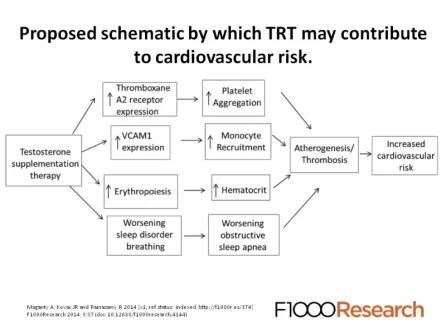Nelson Vergel
Founder, ExcelMale.com
A very well written short opinion article that summarizes factors that may increase cardiovascular risks of testosterone. All have been reviewed on ExcelMale.com but it is nice to see them summarized in a short paper by Dr Lipshultz' team. They did not include high estradiol as a causative factor, however.

Maganty A, Kovac JR and Ramasamy R (2014)
The putative mechanisms underlying testosterone and cardiovascular risk [v1; ref status: indexed, http://f1000r.es/374] F1000Research 2014, 3:87
Abstract
The use of testosterone supplementation therapy (TST) is increasing primarily in men with symptomatic hypogonadism. While TST has been shown to have numerous benefits, as its use increases, the role on cardiovascular health must be explored. Previous evidence showed no adverse cardiovascular risks associated with TST use; however, more recent studies suggest that there may be an associated risk. The exact mechanism by which TST may contribute to cardiovascular risk has not been elucidated. Numerous mechanisms have been proposed which include testosterone's effect on thromboxane A2 receptors, vascular adhesion molecule 1 receptors, erythropoiesis, and obstructive sleep apnea, all of which can ultimately lead to atherogenesis and increased cardiovascular risk.
Quote:
This study's conclusions were similar to that previously discussed, in that men with a hematocrit greater than 50% were 1.8 times (1.1–2.7) more likely to die from CHD compared with men with a hematocrit of less than 50% after adjusting for coronary risk factors13.

Maganty A, Kovac JR and Ramasamy R (2014)
The putative mechanisms underlying testosterone and cardiovascular risk [v1; ref status: indexed, http://f1000r.es/374] F1000Research 2014, 3:87
Abstract
The use of testosterone supplementation therapy (TST) is increasing primarily in men with symptomatic hypogonadism. While TST has been shown to have numerous benefits, as its use increases, the role on cardiovascular health must be explored. Previous evidence showed no adverse cardiovascular risks associated with TST use; however, more recent studies suggest that there may be an associated risk. The exact mechanism by which TST may contribute to cardiovascular risk has not been elucidated. Numerous mechanisms have been proposed which include testosterone's effect on thromboxane A2 receptors, vascular adhesion molecule 1 receptors, erythropoiesis, and obstructive sleep apnea, all of which can ultimately lead to atherogenesis and increased cardiovascular risk.
Quote:
This study's conclusions were similar to that previously discussed, in that men with a hematocrit greater than 50% were 1.8 times (1.1–2.7) more likely to die from CHD compared with men with a hematocrit of less than 50% after adjusting for coronary risk factors13.










